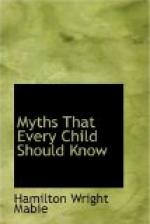“Then open your arms, dear mother,” cried a well-known voice, “and take your little daughter into them.”
And Proserpina came running, and flung herself upon her mother’s bosom. Their mutual transport is not to be described. The grief of their separation had caused both of them to shed a great many tears; and now they shed a great many more, because their joy could not so well express itself in any other way.
When their hearts had grown a little more quiet, Mother Ceres looked anxiously at Proserpina.
“My child,” said she, “did you taste any food while you were in King Pluto’s palace?”
“Dearest mother,” answered Proserpina, “I will tell you the whole truth. Until this very morning, not a morsel of food had passed my lips. But to-day, they brought me a pomegranate (a very dry one it was, and all shrivelled up, till there was little left of it but seeds and skin), and having seen no fruit for so long a time, and being faint with hunger, I was tempted just to bite it. The instant I tasted it, King Pluto and Quicksilver came into the room. I had not swallowed a morsel; but—dear mother, I hope it was no harm—but six of the pomegranate seeds, I am afraid, remained in my mouth.”
“Ah, unfortunate child, and miserable me!” exclaimed Ceres. “For each of those six pomegranate seeds you must spend one month of every year in King Pluto’s palace. You are but half restored to your mother. Only six months with me, and six with that good-for-nothing King of Darkness!”
“Do not speak so harshly of poor King Pluto,” said Proserpina, kissing her mother. “He has some very good qualities; and I really think I can bear to spend six months in his palace, if he will only let me spend the other six with you. He certainly did very wrong to carry me off; but then, as he says, it was but a dismal sort of life for him, to live in that great gloomy place, all alone; and it has made a wonderful change in his spirits to have a little girl to run up stairs and down. There is some comfort in making him so happy; and so, upon the whole, dearest mother, let us be thankful that he is not to keep me the whole year round.”
CHAPTER III
THE CHIMAERA
Once, in the old, old times (for all the strange things which I tell you about happened long before anybody can remember), a fountain gushed out of a hillside, in the marvellous land of Greece. And, for aught I know, after so many thousand years, it is still gushing out of the very selfsame spot. At any rate, there was the pleasant fountain, welling freshly forth and sparkling adown the hillside, in the golden sunset, when a handsome young man named Bellerophon drew near its margin. In his hand he held a bridle, studded with brilliant gems, and adorned with a golden bit. Seeing an old man, and another of middle age, and a little boy, near the fountain, and likewise a maiden, who was dipping up some of the water in a pitcher, he paused, and begged that he might refresh himself with a draught.




